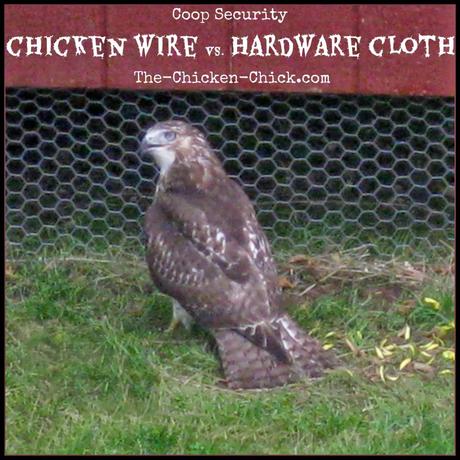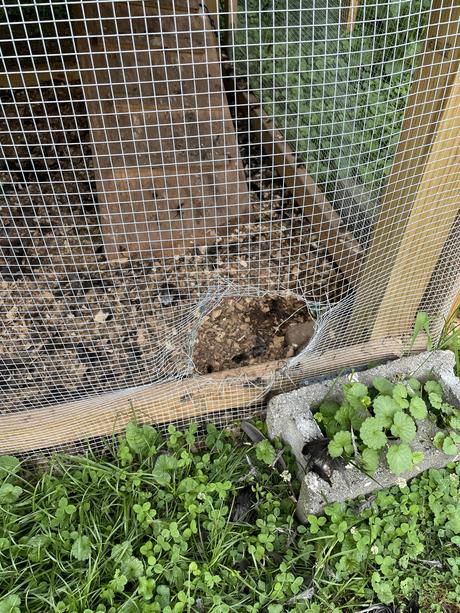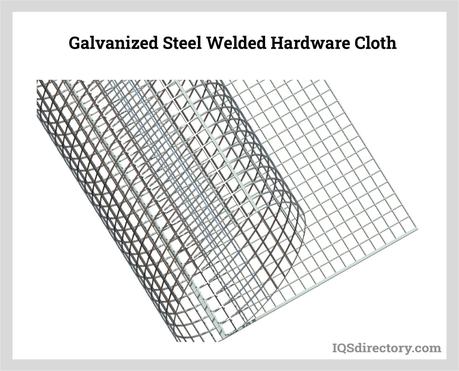Hardware cloth is a versatile wire mesh used for various applications in construction and gardening. It is made of sturdy and durable materials, such as galvanized steel or PVC-coated wires, which make it resistant to corrosion and weathering.
This wire mesh is commonly used to build fences, enclose gardens and protect plants from animals. It can also be used to create cages for pets or to reinforce concrete and plaster. Additionally, hardware cloth comes in different mesh sizes, allowing it to be used for different purposes, such as filtering debris or providing ventilation.
Its strength, flexibility, and affordability make it a popular choice for both residential and commercial projects.

Credit: the-chicken-chick.com
Types Of Hardware Cloth
When it comes to protecting your property, garden, or pets, hardware cloth is an essential tool. It is a versatile and sturdy wire mesh that can be used for a variety of applications. There are different types of hardware cloth available in the market, each offering unique features and benefits. In this article, we will explore the three most popular types of hardware cloth: galvanized hardware cloth, vinyl coated hardware cloth, and stainless steel hardware cloth.
Galvanized Hardware Cloth
Galvanized hardware cloth is made by coating the wire mesh with a layer of zinc, which provides corrosion resistance and durability. This type of hardware cloth is ideal for outdoor applications where exposure to moisture is a concern. The galvanized coating helps to prevent rust and extends the lifespan of the cloth.
Galvanized hardware cloth is commonly used for:
- Garden fencing to protect plants from pests
- Chicken coops to keep predators out
- Tree guards to protect young saplings
- Compost bins to keep rodents away
Vinyl Coated Hardware Cloth
Vinyl coated hardware cloth is similar to galvanized hardware cloth, but with an added layer of PVC coating. This coating not only provides extra protection against rust and corrosion but also gives the cloth a more aesthetically pleasing look. The vinyl coating comes in various colors, allowing you to choose one that blends well with your surroundings.
Vinyl coated hardware cloth is commonly used for:
- Garden enclosures for rabbits or other small animals
- Pet enclosures to create a safe outdoor space
- Deer fencing to protect plants and crops
- Aviaries for bird cages
Stainless Steel Hardware Cloth
Stainless steel hardware cloth is the strongest and most durable option available. It is resistant to rust, corrosion, and even pests. This type of hardware cloth is ideal for applications where maximum strength and protection are required. Stainless steel hardware cloth is made from high-quality stainless steel wires woven together.
Stainless steel hardware cloth is commonly used for:
- Heavy-duty fencing for livestock
- Rodent control in attics or crawl spaces
- Industrial applications where durability is crucial
- Marine environments, as it is resistant to saltwater
Choosing the right type of hardware cloth depends on your specific needs and the intended application. Consider factors such as weather exposure, level of protection required, and aesthetic preferences before selecting the appropriate hardware cloth for your project.
Choosing The Right Hardware Cloth
When it comes to selecting the perfect hardware cloth for your project, there are a few important factors to consider. The right choice will not only ensure the effectiveness of your installation but also the longevity and durability of your investment. In this section, we will discuss the key considerations for different uses, factors to keep in mind when choosing hardware cloth, and how to determine the appropriate mesh size and wire gauge for your specific needs.
Considerations For Different Uses
Before diving into the specifics of hardware cloth, it’s essential to understand the various applications it can be used for. Hardware cloth, also known as wire mesh, is a versatile material that finds its place in a wide range of projects, such as:
- Garden fencing
- Wildlife exclusion
- Pest control
- Tree and plant protection
- Compost bins and cages
- Chicken coops and aviaries
- Construction and DIY projects
Each of these applications has unique requirements, which should be taken into account when selecting the right hardware cloth.
Factors To Consider When Choosing Hardware Cloth
When choosing hardware cloth, certain factors should guide your decision-making process. These include:
- Material: Hardware cloth is commonly available in galvanized steel, stainless steel, and vinyl-coated options. Each material offers varying levels of corrosion resistance, durability, and aesthetic appeal.
- Mesh size: The mesh size refers to the space between the wires and determines the level of protection the hardware cloth provides. Smaller mesh sizes are ideal for keeping out insects and small animals, while larger sizes are suitable for larger animals or general purposes.
- Wire gauge: Wire gauge refers to the thickness of the wire used to create the cloth. Thicker wires offer increased strength and durability, making them suitable for heavy-duty applications.
- Roll size: Consider the dimensions of the roll and ensure it aligns with the size of your project. Opting for a roll that provides some flexibility can be beneficial if you’re unsure of the precise measurements needed.
Determining Mesh Size And Wire Gauge
When determining the appropriate mesh size and wire gauge for your intended use, it’s important to balance the required strength with functionality. Here are a few tips to help you navigate this decision:
- Identify the target: Understand the size of the animals or pests you want to keep out or the purpose you want to fulfill with the hardware cloth. This knowledge will guide you in selecting the right mesh size.
- Consider the environment: Assess the conditions in which the hardware cloth will be exposed. If it will be subjected to harsh weather, corrosion resistance becomes even more critical.
- Consult manufacturer guidelines: Manufacturers often provide recommendations for the suitable mesh size and wire gauge based on specific applications, so be sure to review these guidelines.
By considering these factors and taking the time to determine the appropriate mesh size and wire gauge, you can confidently choose the hardware cloth best suited for your needs while ensuring optimal performance and longevity.
Installation And Maintenance
When it comes to installing and maintaining hardware cloth, careful planning and attention to detail are essential. Proper installation ensures the effectiveness and durability of the cloth, while thorough maintenance helps prolong its lifespan. In this section, we will discuss the steps and tips for installing and maintaining hardware cloth.
Preparing The Installation Area
Before you begin the installation process, it is important to properly prepare the area where the hardware cloth will be installed. Here are some key considerations:
- Clear the area of any debris, rocks, or plant growth that may hinder installation or compromise the integrity of the cloth.
- Ensure there is sufficient space for the hardware cloth to be securely attached to the required surfaces.
- Inspect the surrounding area for potential hazards or obstacles that may interfere with the installation process.
Tools And Materials Needed For Installation
To install hardware cloth effectively, you will need the following tools and materials:
ToolsMaterials
Wire cutter or tin snipsHardware cloth
Tape measureStaples or screws
Gloves and safety glassesSupport posts or structures
Hammer or drillFasteners (such as nails or screws)
Installation Steps
To ensure a successful installation of hardware cloth, follow these steps:
- Measure the dimensions of the area where the hardware cloth will be installed, and cut the cloth to the appropriate size using wire cutters or tin snips.
- Position the hardware cloth against the desired surface, ensuring it is taut and properly aligned.
- Secure the cloth to the surface using staples, screws, or other fasteners. For added stability, consider using support posts or structures.
- Repeat the process for any additional sections of hardware cloth that need to be installed.
Maintenance Tips For Hardware Cloth
To maintain the functionality and effectiveness of hardware cloth, keep in mind the following tips:
- Regularly inspect the cloth for any signs of damage, such as tears or rust. Promptly repair or replace any compromised sections.
- Keep the area around the hardware cloth clear of debris to prevent blockages or obstructions.
- Periodically check the fasteners and tighten or replace them as needed to ensure the cloth remains securely in place.
- Consider treating the hardware cloth with a protective coating, such as galvanization, to enhance its resistance to rust and corrosion.
- If the hardware cloth becomes dirty or clogged, clean it gently using mild soap and water, and allow it to dry thoroughly before reinstalling.

Credit: www.reddit.com

Credit: www.iqsdirectory.com
Frequently Asked Questions On What Is Hardware Cloth?
Is Hardware Cloth The Same As Chicken Wire?
Hardware cloth and chicken wire, though similar, are not the same. Hardware cloth is made of sturdy, galvanized steel wire, providing better protection against predators. Chicken wire, on the other hand, is made of thinner, less durable wire and is primarily used to contain chickens.
Can Raccoons Get Through Hardware Cloth?
Yes, raccoons can get through hardware cloth.
What Cuts Through Hardware Cloth?
Wire cutters or metal shears can easily cut through hardware cloth. They are designed to handle the tough wires used in the cloth and make clean, precise cuts.
Is Hardware Cloth The Same As Gopher Wire?
Hardware cloth and gopher wire are not the same. Hardware cloth is a mesh wiring used for fencing and screening, while gopher wire is specifically designed to prevent gophers from burrowing. Thus, they serve different purposes.
Faq 1: What Is Hardware Cloth Made Of?
Hardware cloth is typically made of galvanized steel wire, which provides excellent durability and resistance against rust and corrosion.
Conclusion
To sum up, hardware cloth is a versatile and durable wire mesh that comes in various sizes and gauges. It serves multiple purposes, such as protecting gardens from pests, constructing animal enclosures, or securing property. Its strength and flexibility make it a valuable tool for DIY enthusiasts and professionals alike.
Whether you’re fencing, gardening, or crafting, hardware cloth is a must-have material that provides both practicality and peace of mind. So, consider incorporating hardware cloth into your projects for its reliability and long-lasting performance.
